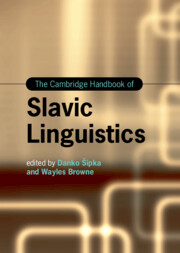Book contents
- The Cambridge Handbook of Slavic Linguistics
- Cambridge Handbooks in Language and Linguistics
- The Cambridge Handbook of Slavic Linguistics
- Copyright page
- Contents
- Figures
- Tables
- Contributors
- Introduction
- Part 1 Prosody and Phonology
- Part 2 Inflectional and Derivational Morphology
- Part 3 Syntax
- 13 Agreement
- 14 Wh-Constructions and Wh-Dependencies
- 15 Coordination and Subordination in Slavic Languages
- 16 Numerals and Quantity Expressions
- 17 Placement and Ordering of the (En)clitics
- 18 Secondary Predication
- 19 Negation and Polarity
- 20 Null Subjects
- 21 Voice
- 22 Morphosyntactic Reflexes of Information Structure
- Part 4 Lexicon
- Part 5 Sociolinguistic and Geographical Approaches
- Part 6 Experimental and Quantitative Approaches
- Name Index
- Subject Index
- References
17 - Placement and Ordering of the (En)clitics
from Part 3 - Syntax
Published online by Cambridge University Press: 16 May 2024
- The Cambridge Handbook of Slavic Linguistics
- Cambridge Handbooks in Language and Linguistics
- The Cambridge Handbook of Slavic Linguistics
- Copyright page
- Contents
- Figures
- Tables
- Contributors
- Introduction
- Part 1 Prosody and Phonology
- Part 2 Inflectional and Derivational Morphology
- Part 3 Syntax
- 13 Agreement
- 14 Wh-Constructions and Wh-Dependencies
- 15 Coordination and Subordination in Slavic Languages
- 16 Numerals and Quantity Expressions
- 17 Placement and Ordering of the (En)clitics
- 18 Secondary Predication
- 19 Negation and Polarity
- 20 Null Subjects
- 21 Voice
- 22 Morphosyntactic Reflexes of Information Structure
- Part 4 Lexicon
- Part 5 Sociolinguistic and Geographical Approaches
- Part 6 Experimental and Quantitative Approaches
- Name Index
- Subject Index
- References
Summary
This chapter presents an overview of some of the properties of Slavic clitics. In principle, clitics seem easy to identify: they are phonologically dependent functional elements that appear in a fixed, syntactically defined position in the clitic cluster but otherwise behave like other independent syntactic elements. But these characteristics are fraught with exceptions. We focus on these exceptions in the chapter to show that clitics, although lexically stressless, in certain contexts can be stressed; although they seem to have a fixed position in a sentence, they can appear in unexpected positions both within the clause and within the clitic cluster; although they are functional elements whose position is governed by universal principles, their positioning differs across Slavic languages, and, despite being syntactically independent elements, they occasionally disobey constraints that other syntactically independent elements typically obey.
- Type
- Chapter
- Information
- The Cambridge Handbook of Slavic Linguistics , pp. 365 - 384Publisher: Cambridge University PressPrint publication year: 2024

